Related Research Articles

The Bethlehem Steel Corporation was an American company that for much of the 20th century was one of the world's largest steel producing and shipbuilding companies.

Dunkirk is a city in Chautauqua County, New York, in the United States. It was settled around 1805 and incorporated in 1880. The population was 12,743 as of the 2020 census, with an estimated population of 11,756 in 2019. Dunkirk is bordered on the north by Lake Erie. It shares a border with the village of Fredonia to the south, and with the town of Dunkirk to the east and west. Dunkirk is the westernmost city in the state of New York.
The Erie Railroad was a railroad that operated in the northeastern United States, originally connecting New York City — more specifically Jersey City, New Jersey, where Erie's Pavonia Terminal, long demolished, used to stand — with Lake Erie, at Dunkirk, New York. It expanded west to Chicago with its 1865 merger with the former Atlantic and Great Western Railroad, also known as the New York, Pennsylvania and Ohio Railroad. Its mainline route proved influential in the development and economic growth of the Southern Tier of New York State, including cities such as Binghamton, Elmira, and Hornell. The Erie Railroad repair shops were located in Hornell and was Hornell's largest employer. Hornell was also where Erie's mainline split into two routes, one north to Buffalo and the other west to Chicago.

William Hartman Woodin was a U.S. industrialist. He served as the Secretary of Treasury under Franklin Roosevelt in 1933.
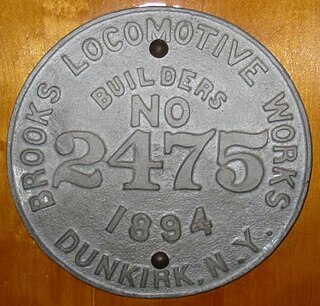
The Brooks Locomotive Works manufactured railroad steam locomotives and freight cars from 1869 through its merger into the American Locomotive Company (ALCO) in 1901.

ACF Industries, originally the American Car and Foundry Company, is an American manufacturer of railroad rolling stock. One of its subsidiaries was once (1925–54) a manufacturer of motor coaches and trolley coaches under the brand names of (first) ACF and (later) ACF-Brill. Today, the company is known as ACF Industries LLC and is based in St. Charles, Missouri. It is owned by investor Carl Icahn.

Horatio G. Brooks worked as chief engineer for the New York and Erie Railroad (NY&E) until the railroad moved its steam locomotive maintenance facilities from Dunkirk, New York, to Buffalo. In 1869 he leased the former NY&E shops in Dunkirk and formed Brooks Locomotive Works. Brooks also served for three terms as mayor of Dunkirk. He was a leading figure in the business and social life of the area around Dunkirk, and western New York state.

The J.G. Brill Company manufactured streetcars, interurban coaches, motor buses, trolleybuses and railroad cars in the United States for almost ninety years, making it the longest-lasting trolley and interurban manufacturer. At its height, Brill was the largest manufacturer of streetcars and interurban cars in the US and produced more streetcars, interurbans and gas-electric cars than any other manufacturer, building more than 45,000 streetcars alone.

Canadian Car and Foundry (CC&F), also variously known as "Canadian Car & Foundry" or more familiarly as "Can Car", was a manufacturer of buses, railway rolling stock, forestry equipment, and later aircraft for the Canadian market. CC&F history goes back to 1897, but the main company was established in 1909 from an amalgamation of several companies and later became part of Hawker Siddeley Canada through the purchase by A.V. Roe Canada in 1957. Today the remaining factories are part of Bombardier Transportation Canada.
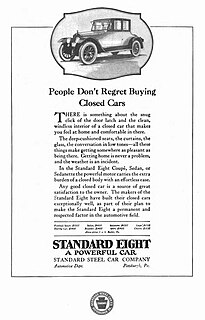
The Standard Steel Car Company (SSC) was a manufacturer of railroad rolling stock in the United States that existed between 1902 and 1934.
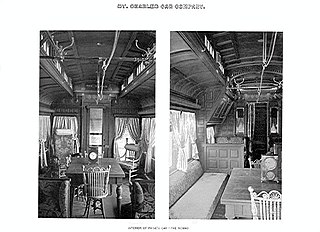
St. Charles Car Company, a railroad rolling stock manufacturing company located in St. Charles, Missouri, was founded in 1872 or 1873. In 1899 it merged with twelve other companies to form American Car and Foundry (ACF). The St. Charles plant became the main passenger car works. With a failing market for steel passenger cars, ACF phased out the St. Charles operation in 1959.
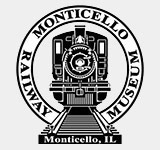
The Monticello Railway Museum is a non-profit railroad museum located in Monticello, Illinois, about 18 miles west of Champaign, IL. It is home to over 100 pieces of railroad equipment, including several restored diesel locomotives and cars.
The Michigan-Peninsular Car Company was a railroad rolling stock manufacturing company formed from the merger of five manufacturing companies in 1892. It was Detroit's largest manufacturer before the rise of the automotive industry.
Ensign Manufacturing Company, founded as Ensign Car Works in 1872, was a railroad car manufacturing company based in Huntington, West Virginia. In the 1880s and 1890s Ensign's production of wood freight cars made the company one of the three largest sawmill operators in Cabell County. In 1899, Ensign and twelve other companies were merged to form American Car and Foundry Company.
Jackson & Woodin Manufacturing Company, also called Jackson & Woodin Car Works, was an American railroad freight car manufacturing company of the late 19th century headquartered in Berwick, Pennsylvania. In 1899, Jackson and Woodin was merged with twelve other freight car manufacturing companies to form American Car & Foundry Company. Jackson and Woodin's management were proponents of the temperance movement in America, and went as far as buying all the saloons and hotels in Berwick, leading to Berwick becoming a dry town by 1881. By the time of the 1899 merger that created American Car and Foundry Company (ACF), Jackson & Woodin was the largest freight car manufacturer in the eastern United States. The Jackson & Woodin shops became ACF's Berwick Plant, a plant that was heavily used by ACF.
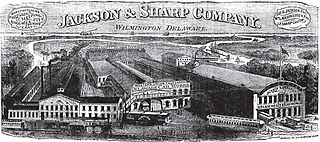
Jackson and Sharp Company was an American railroad car manufacturer and shipbuilder in the late 19th and early 20th centuries. The company was founded in 1863 by Job H. Jackson, a tinsmith and retail merchant, and Jacob F. Sharp, a carpenter who had worked for rail car manufacturers and shipbuilders.

Gilbert Car Company was a railroad car builder based in Troy, New York. It began manufacturing streetcars in the late 1880s. Gilbert cars were sold and exported worldwide.

The Hale & Kilburn company of Philadelphia was a furniture manufacturing company founded by Warren Hale and Cheney Kilburn. The Hale & Kilburn company's primary business was the production of railroad car seats for the greatly expanding American railroad companies.
The Eureka Iron & Steel Works was an American iron and steel company in Wyandotte, Michigan. It started in 1853 with the discovery of unusually high-quality iron ore in the Upper Peninsula of Michigan. A group of businessmen in the Detroit area figured this could be a profitable enterprise to manufacture iron and steel, so they pooled together funds to form a new company. The company produced the first commercially available steel in America. One of the first uses for this steel was tracks for railroads. It was in business until 1892.
References
- ↑ American Iron and Steel Association (1889). "Carbuilders". Directory of Iron and Steel Works of the United States and Canada (PDF) (Tenth ed.). Philadelphia, PA: Allen, Lane & Scott. p. 215.
- 1 2 3 4 5 "Buffalo Car Company". Mid-Continent Railway Museum. 2006-04-09. Retrieved 2008-04-13.
- 1 2 "The ACF Industries Archival Collection". John W. Barriger III National Railroad Library. Retrieved 2008-04-13.
- ↑ "Notice of Copartnership". Buffalo Courier. Buffalo, NY. 1853-02-24. p. 3. Retrieved 2021-04-03– via Newspapers.com.
- ↑ "The Buffalo Car Company". Buffalo Courier. Buffalo, NY. 1854-03-04. p. 2. Retrieved 2021-04-03– via Newspapers.com.
- ↑ White, John H. Jr. (1993). The American Railroad Freight Car: From the Wood-Car Era to the Coming of Steel. Baltimore: Johns Hopkins University Press. p. 142. ISBN 0-8018-4404-5. OCLC 26130632.
- ↑ "Buffalo Car Works". midcontinent.org. 2006-04-09. Retrieved 2021-04-03.
- ↑ "Local Intelligence - Buffalo Car Works". The Buffalo Daily Republic. Buffalo, NY. 1857-08-28. p. 3. Retrieved 2021-04-03– via Newspapers.com.
- ↑ "Public Notice is Hereby Given..." Chicago Tribune . 1857-05-27. Retrieved 2021-04-03– via Newspapers.com.
- ↑ "One report of the occasion..." Buffalo Express. Buffalo, NY. 1871-11-02. p. 1. Retrieved 2021-04-03– via Newspapers.com.
- ↑ "A New Manager". The Buffalo Commercial. Buffalo, NY. 1873-05-30. Retrieved 2021-04-03– via Newspapers.com.
- ↑ "The Gilbert Car Company". The Buffalo Commercial. Buffalo, New York. October 14, 1879. p. 3 – via Newspapers.com.

- ↑ "New Cars for the Central" (PDF). New York Times. 1895-03-08. Retrieved 2008-04-13.
- ↑ Bianculli, Anthony J (2001). Trains and Technology: The American Railroad in the Nineteenth Century. Vol. 2: Cars. Newark: University of Delaware Press. p. 113. ISBN 0-87413-730-6.
- ↑ McKnight, Patrick (2000-06-15). "Draft Report of Rutland Baggage Car No. 129". Remembering the Rutland. Retrieved 2008-04-13.